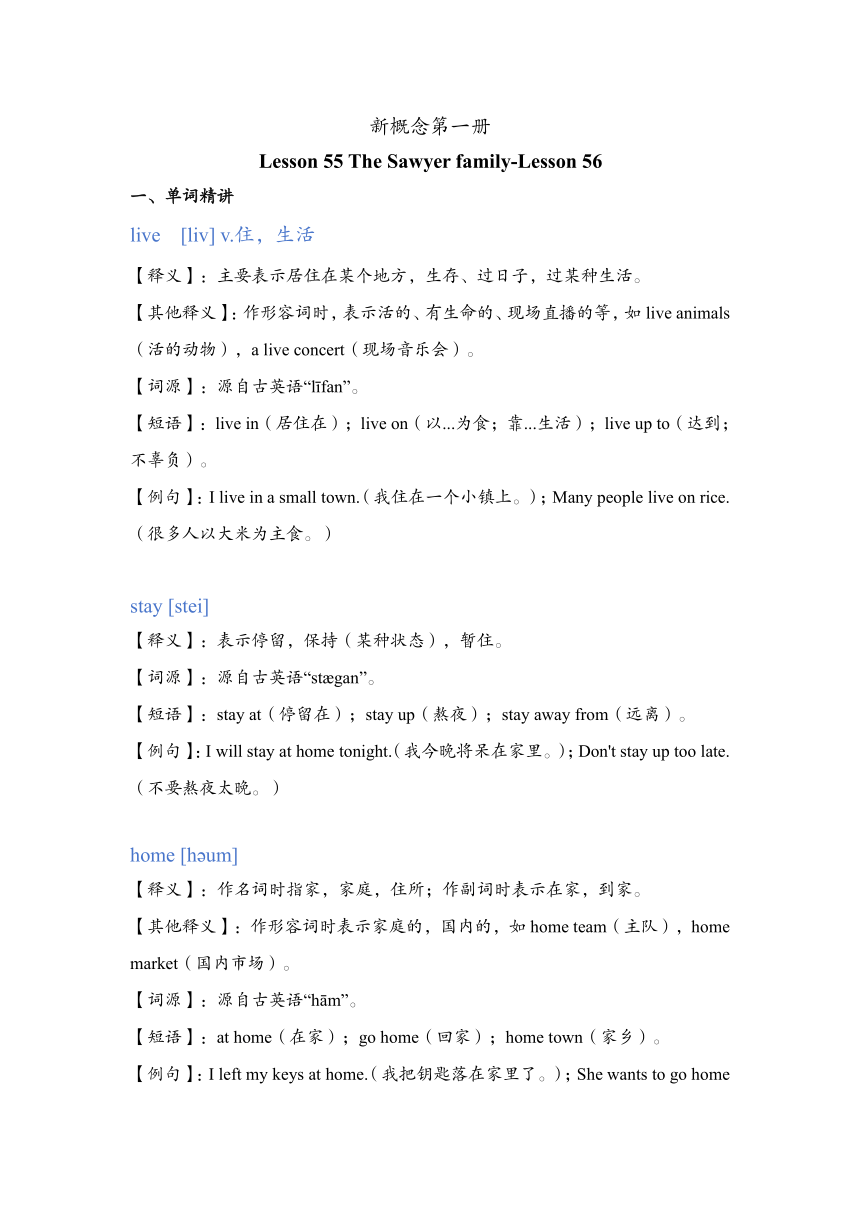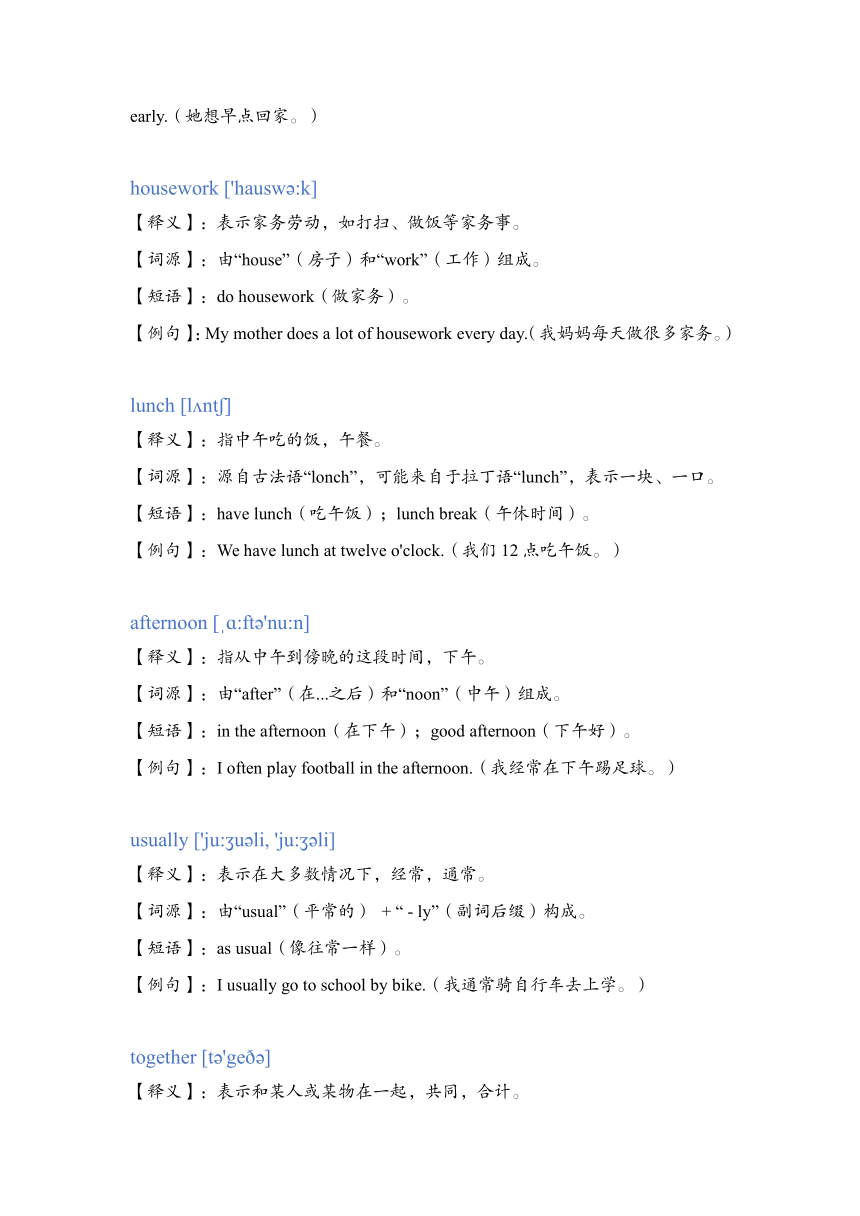新概念第一册Lesson 55 The Sawyer family-Lesson 56讲义
文档属性
| 名称 | 新概念第一册Lesson 55 The Sawyer family-Lesson 56讲义 |  | |
| 格式 | docx | ||
| 文件大小 | 95.8KB | ||
| 资源类型 | 教案 | ||
| 版本资源 | 新概念英语 | ||
| 科目 | 英语 | ||
| 更新时间 | 2024-12-03 09:38:23 | ||
图片预览


文档简介
新概念第一册
Lesson 55 The Sawyer family-Lesson 56
单词精讲
live [liv] v.住,生活
【释义】:主要表示居住在某个地方,生存、过日子,过某种生活。
【其他释义】:作形容词时,表示活的、有生命的、现场直播的等,如live animals(活的动物),a live concert(现场音乐会)。
【词源】:源自古英语“līfan”。
【短语】:live in(居住在);live on(以...为食;靠...生活);live up to(达到;不辜负)。
【例句】:I live in a small town.(我住在一个小镇上。);Many people live on rice.(很多人以大米为主食。)
stay [stei]
【释义】:表示停留,保持(某种状态),暂住。
【词源】:源自古英语“st gan”。
【短语】:stay at(停留在);stay up(熬夜);stay away from(远离)。
【例句】:I will stay at home tonight.(我今晚将呆在家里。);Don't stay up too late.(不要熬夜太晚。)
home [h um]
【释义】:作名词时指家,家庭,住所;作副词时表示在家,到家。
【其他释义】:作形容词时表示家庭的,国内的,如home team(主队),home market(国内市场)。
【词源】:源自古英语“hām”。
【短语】:at home(在家);go home(回家);home town(家乡)。
【例句】:I left my keys at home.(我把钥匙落在家里了。);She wants to go home early.(她想早点回家。)
housework ['hausw :k]
【释义】:表示家务劳动,如打扫、做饭等家务事。
【词源】:由“house”(房子)和“work”(工作)组成。
【短语】:do housework(做家务)。
【例句】:My mother does a lot of housework every day.(我妈妈每天做很多家务。)
lunch [l nt ]
【释义】:指中午吃的饭,午餐。
【词源】:源自古法语“lonch”,可能来自于拉丁语“lunch”,表示一块、一口。
【短语】:have lunch(吃午饭);lunch break(午休时间)。
【例句】:We have lunch at twelve o'clock.(我们12点吃午饭。)
afternoon [ ɑ:ft 'nu:n]
【释义】:指从中午到傍晚的这段时间,下午。
【词源】:由“after”(在...之后)和“noon”(中午)组成。
【短语】:in the afternoon(在下午);good afternoon(下午好)。
【例句】:I often play football in the afternoon.(我经常在下午踢足球。)
usually ['ju: u li, 'ju: li]
【释义】:表示在大多数情况下,经常,通常。
【词源】:由“usual”(平常的) + “ - ly”(副词后缀)构成。
【短语】:as usual(像往常一样)。
【例句】:I usually go to school by bike.(我通常骑自行车去上学。)
together [t 'ge ]
【释义】:表示和某人或某物在一起,共同,合计。
【词源】:由“to”(向)和“gether”(聚集)组成。
【短语】:get together(聚会;聚集);together with(和...一起)。
【例句】:We often play together.(我们经常一起玩。)
evening ['i:vni ]
【释义】:指从下午到夜晚的这段时间,傍晚,晚上。
【词源】:源自古英语“ fnung”,表示傍晚时分。
【短语】:in the evening(在晚上);good evening(晚上好)。
【例句】:We watch TV in the evening.(我们晚上看电视。)
arrive [ 'raiv]
【释义】:表示到达某个地方,抵达。
【词源】:源自古法语“arriver”,来自拉丁语“adripare”,表示到岸边。
【短语】:arrive at(到达小地点,如车站、学校等);arrive in(到达大地点,如城市、国家等)。
【例句】:We will arrive at the airport at 9 o'clock.(我们将在9点到达机场。)
night [nait]
【释义】:指从日落到日出的这段时间,夜晚。
【词源】:源自古英语“niht”。
【短语】:at night(在夜晚);night - time(夜间)。
【例句】:It's very quiet at night.(夜晚很安静。)
重点句型
一般现在时:
①一般现在时用于表示一个习惯动作、有规律的行为以及永恒的现象。一般与时间频度副词和时间短语连用。这些时间短语有:
every day/week/month/year 每日/周/月/年
in the morning/afternoon/evening 在上午/下午/晚上
at noon/night 在正午/夜里
②第三人称单数的谓语动词需加以变位,这可分为几种情况:
(1)直接加 -s,如:
come----comes
arrive----arrives
(2)以 -sh, -ch, -o 以及 -s结尾的动词加 -es,如:
wash----washes
go----goes
watch----watches
do----does
(3)以辅音加 -y结尾的动词,把 -y改成 -i,再加 -es;而元音加 -y结尾的动词,只加 -s即可:
hurry----hurries
carry----carries
play----plays
stay----stays
三、课文精讲
1.The Sawyers live at 87 King Street.
the Sawyers 和the Sawyer family都可以表示索耶一家人的意思。
2.In the morning, Mr Sawyer goes to work and the children go to school.
Mr.Sawyer是第三人称单数,go后面要加es;children是child的复数形式,所以后面的go不需要变换形式。
go to work, 上班。
由动词 go引导的短语课文中还有:go to school(上学), go to bed(上床睡觉)。请注意 work, school以及 bed之前不带任何冠词。
3.Their father takes them to school every day.
take sb to 带某人去某处
4.Mrs Sawyer stays at home every day.
stay at home, 呆在家里。
与 stay home在意思上相差无几。前者中的 home是名词,后者中的home是副词。
5.They often drink tea together.
drink tea 喝茶
6.In the evening, the children come home from school.
come home 回家
7.At night, the children always do their homework.
do homework 做作业
at night, 在夜里。
如果说某日夜里,则用介词 on:
on the night of June 2 在6月2日的夜里
do the housework, 料理家务。
housework是不可数名词。请比较:do the homework(做作业)。
8.Mr. Sawyer usually reads his newspaper, but sometimes he and his wife watch television.
read newspaper 看报纸
watch television 看电视
Lesson 55 The Sawyer family-Lesson 56
单词精讲
live [liv] v.住,生活
【释义】:主要表示居住在某个地方,生存、过日子,过某种生活。
【其他释义】:作形容词时,表示活的、有生命的、现场直播的等,如live animals(活的动物),a live concert(现场音乐会)。
【词源】:源自古英语“līfan”。
【短语】:live in(居住在);live on(以...为食;靠...生活);live up to(达到;不辜负)。
【例句】:I live in a small town.(我住在一个小镇上。);Many people live on rice.(很多人以大米为主食。)
stay [stei]
【释义】:表示停留,保持(某种状态),暂住。
【词源】:源自古英语“st gan”。
【短语】:stay at(停留在);stay up(熬夜);stay away from(远离)。
【例句】:I will stay at home tonight.(我今晚将呆在家里。);Don't stay up too late.(不要熬夜太晚。)
home [h um]
【释义】:作名词时指家,家庭,住所;作副词时表示在家,到家。
【其他释义】:作形容词时表示家庭的,国内的,如home team(主队),home market(国内市场)。
【词源】:源自古英语“hām”。
【短语】:at home(在家);go home(回家);home town(家乡)。
【例句】:I left my keys at home.(我把钥匙落在家里了。);She wants to go home early.(她想早点回家。)
housework ['hausw :k]
【释义】:表示家务劳动,如打扫、做饭等家务事。
【词源】:由“house”(房子)和“work”(工作)组成。
【短语】:do housework(做家务)。
【例句】:My mother does a lot of housework every day.(我妈妈每天做很多家务。)
lunch [l nt ]
【释义】:指中午吃的饭,午餐。
【词源】:源自古法语“lonch”,可能来自于拉丁语“lunch”,表示一块、一口。
【短语】:have lunch(吃午饭);lunch break(午休时间)。
【例句】:We have lunch at twelve o'clock.(我们12点吃午饭。)
afternoon [ ɑ:ft 'nu:n]
【释义】:指从中午到傍晚的这段时间,下午。
【词源】:由“after”(在...之后)和“noon”(中午)组成。
【短语】:in the afternoon(在下午);good afternoon(下午好)。
【例句】:I often play football in the afternoon.(我经常在下午踢足球。)
usually ['ju: u li, 'ju: li]
【释义】:表示在大多数情况下,经常,通常。
【词源】:由“usual”(平常的) + “ - ly”(副词后缀)构成。
【短语】:as usual(像往常一样)。
【例句】:I usually go to school by bike.(我通常骑自行车去上学。)
together [t 'ge ]
【释义】:表示和某人或某物在一起,共同,合计。
【词源】:由“to”(向)和“gether”(聚集)组成。
【短语】:get together(聚会;聚集);together with(和...一起)。
【例句】:We often play together.(我们经常一起玩。)
evening ['i:vni ]
【释义】:指从下午到夜晚的这段时间,傍晚,晚上。
【词源】:源自古英语“ fnung”,表示傍晚时分。
【短语】:in the evening(在晚上);good evening(晚上好)。
【例句】:We watch TV in the evening.(我们晚上看电视。)
arrive [ 'raiv]
【释义】:表示到达某个地方,抵达。
【词源】:源自古法语“arriver”,来自拉丁语“adripare”,表示到岸边。
【短语】:arrive at(到达小地点,如车站、学校等);arrive in(到达大地点,如城市、国家等)。
【例句】:We will arrive at the airport at 9 o'clock.(我们将在9点到达机场。)
night [nait]
【释义】:指从日落到日出的这段时间,夜晚。
【词源】:源自古英语“niht”。
【短语】:at night(在夜晚);night - time(夜间)。
【例句】:It's very quiet at night.(夜晚很安静。)
重点句型
一般现在时:
①一般现在时用于表示一个习惯动作、有规律的行为以及永恒的现象。一般与时间频度副词和时间短语连用。这些时间短语有:
every day/week/month/year 每日/周/月/年
in the morning/afternoon/evening 在上午/下午/晚上
at noon/night 在正午/夜里
②第三人称单数的谓语动词需加以变位,这可分为几种情况:
(1)直接加 -s,如:
come----comes
arrive----arrives
(2)以 -sh, -ch, -o 以及 -s结尾的动词加 -es,如:
wash----washes
go----goes
watch----watches
do----does
(3)以辅音加 -y结尾的动词,把 -y改成 -i,再加 -es;而元音加 -y结尾的动词,只加 -s即可:
hurry----hurries
carry----carries
play----plays
stay----stays
三、课文精讲
1.The Sawyers live at 87 King Street.
the Sawyers 和the Sawyer family都可以表示索耶一家人的意思。
2.In the morning, Mr Sawyer goes to work and the children go to school.
Mr.Sawyer是第三人称单数,go后面要加es;children是child的复数形式,所以后面的go不需要变换形式。
go to work, 上班。
由动词 go引导的短语课文中还有:go to school(上学), go to bed(上床睡觉)。请注意 work, school以及 bed之前不带任何冠词。
3.Their father takes them to school every day.
take sb to 带某人去某处
4.Mrs Sawyer stays at home every day.
stay at home, 呆在家里。
与 stay home在意思上相差无几。前者中的 home是名词,后者中的home是副词。
5.They often drink tea together.
drink tea 喝茶
6.In the evening, the children come home from school.
come home 回家
7.At night, the children always do their homework.
do homework 做作业
at night, 在夜里。
如果说某日夜里,则用介词 on:
on the night of June 2 在6月2日的夜里
do the housework, 料理家务。
housework是不可数名词。请比较:do the homework(做作业)。
8.Mr. Sawyer usually reads his newspaper, but sometimes he and his wife watch television.
read newspaper 看报纸
watch television 看电视
同课章节目录
